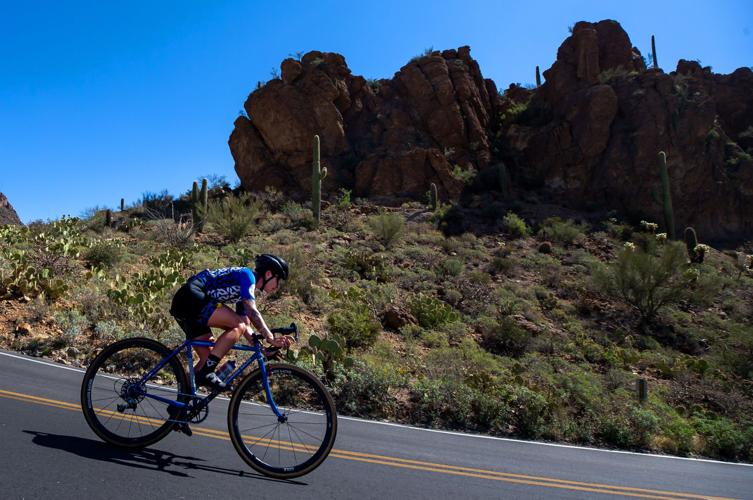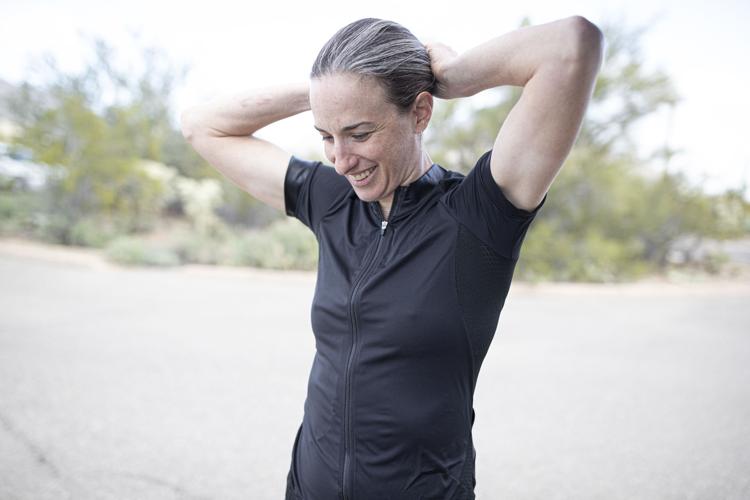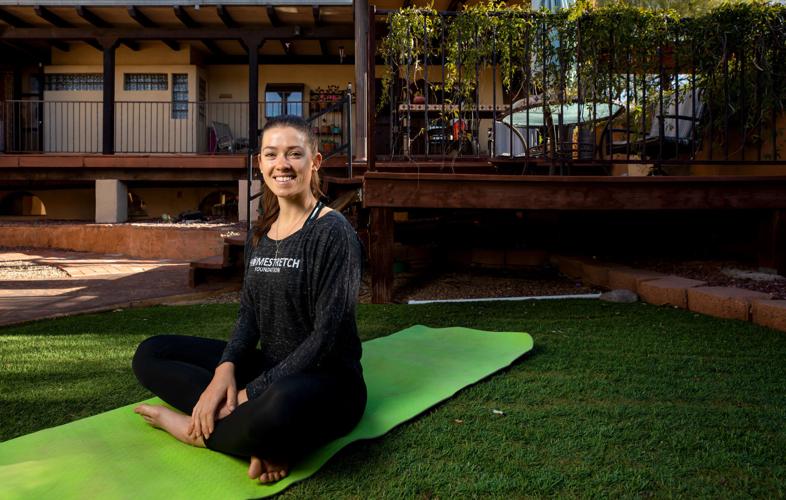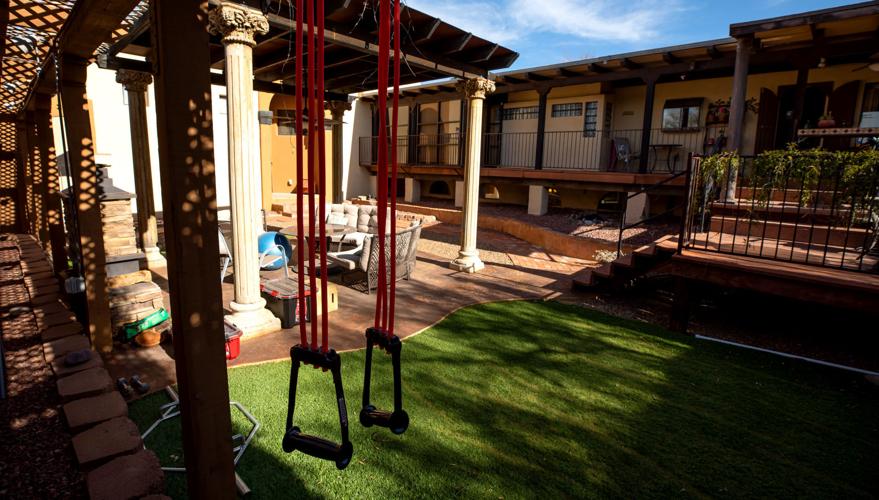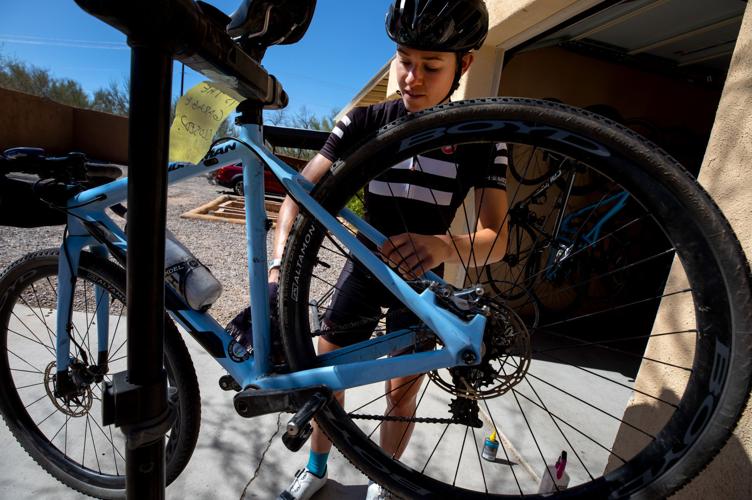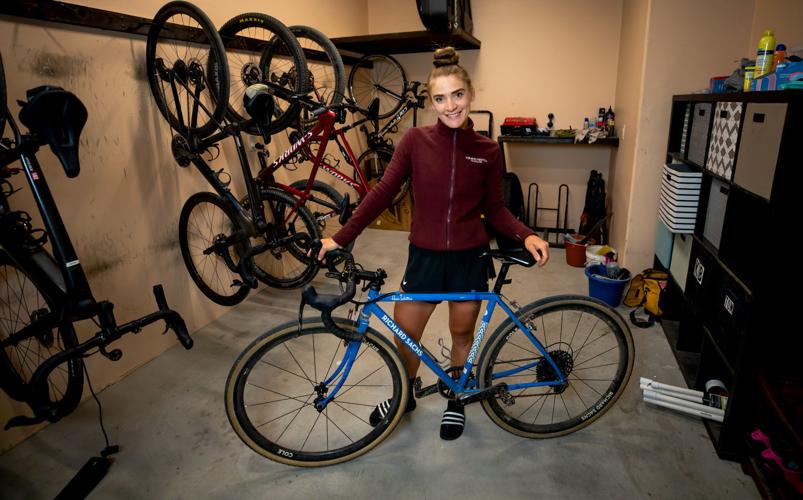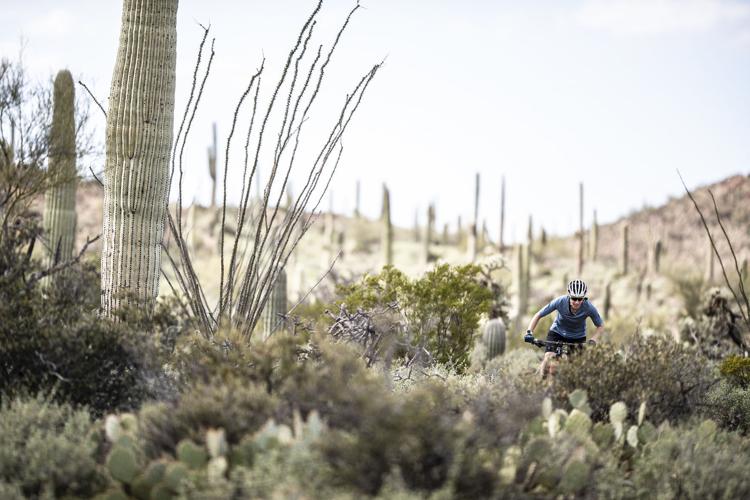For two-time Olympic mountain biker Lea Davison, the road to this summer’s Tokyo games runs past feed stores and sprawling pastures full of horses, and into a peaceful desert neighborhood off Tanque Verde Road on Tucson’s east side.
For the past month or so, Davison has been staying at a 4,000-square foot, split-level home built in the early 1980s and purchased in 2016 by local nonprofit the Homestretch Foundation.
The property has a suspended, wooden walkway connecting Davison’s suite to the main house; large, Grecian-style columns adorning the backyard patio; a meditation garden with man-made creek running through the property, and a basement that was built years after the main house.
It’s a home that was seemingly designed for the group-living that Homestretch had envisioned, decades before the idea became reality.
For the past five years, Homestretch has provided housing to more than 70 female athletes from 17 countries. The “Stretchies” who stay at the house are typically pursuing a career in endurance sports, including cycling, triathlon, swimming or running. This is Davison’s fourth stay at the Homestretch house, and she says that despite the different conditions that COVID-19 has created, the community there remains strong and the opportunity continues to be a game-changer in cycling.

Some resistance bands are photographed inside the outdoor gym at the Homestretch Foundation house. The Tucson-based nonprofit provides female professional athletes a rent-free place to live while training for their sports.
‘If I were a man, this wouldn’t be an issue’
Founder Kathryn Bertine got the idea for Homestretch through her own struggles as a professional cyclist. In 2015, a year before she retired from the sport, Bertine found herself going through a divorce and struggling without a base salary.
“If I’d had a base salary for my job, I’d be OK. But I couldn’t work two jobs and be a pro cyclist,” Bertine, 45, said. “I kept thinking: ‘If I were a man, this wouldn’t be an issue.’”
Bertine, who a few years before had helped women push their way into the Tour de France, initially wanted to fight for the Union Cycliste Internationale to allocate base salaries for their female pro cyclists like men are paid. Knowing that could take years, she decided to help women in the interim.
She linked up with Tom Bailey, and in November 2016, they launched the Homestretch Foundation.
The home’s first resident was a tortoiseshell cat that Bertine noticed hanging out on the property. She learned from neighbors that it belonged to the former tenant, who had moved out several months prior. Bertine took the cat in, saying she figured that it was already her home, and named her Persistence.
In addition to room and board, Homestretch offers its residents assistance with contract and salary negotiations, mentorship, job-search assistance and discounted or free services, including coaching, training, medical care, physical therapists and rehabilitation professionals.
There are benefits to the community, as well. Pre-pandemic, residents led weekly rides called “Spin with the Stretchies” that departed down the street from the house, at Le Buzz Cafe. The ride’s slow pace allowed residents to have conversations with local riders, which Bertine said both the “Stretchies” and amateur cyclists enjoyed.
Bertine was right about the salary fight. It was several more years before the UCI set a base salary for women at the World Tour level in 2020, but it’s not a livable wage or equitable to the men’s salary. The UCI guarantees their male pros at the World Tour level a minimum annual base salary of 40,000 Euros, or roughly $48,000. Men at the Pro Continental level, or minor leagues of professional cycling, earn 30,000 Euros — or $36,000.
The average salary for women pros at the World Tour level is approximately $24,000, while women who compete at the Pro Continental level have no base salary and often receive less than $10,000 a year.
Salary for women pros will be fully equal in 2023.
‘Like college for pro cycling’
Davison, 37, discovered the foundation after competing in the 2016 Summer Games, her second Olympics. Her coach at the time grew up in Tucson, and always raved about the weather and the riding here.
Davison, who hails from Sunderland, Vermont, was training in Tucson in 2018. While she knew about Homestretch through some friends in the cycling community, she was staying somewhere else.
Davison eventually reached out to Bertine. While there was no space at Homestretch, which typically houses six to eight athletes at a time, Bertine linked Davison up with a host family for the remainder of her stay.
After spending three winters in a row training in Vermont, Davison said her year in Tucson was a “whole different scene.”
She returned the next year to a room in the Homestretch house, and finally got the full experience.

Lea Davison has been living in a Tucson home for the last month while she trains for the upcoming Olympic qualifiers.
“It’s like college for pro cycling,” Davison said. “I’m 100% an extrovert, so it’s a really great community to be a part of. It’s super fun to be around like-minded women who get it, who completely understand what we’re trying to do.”
The sense of community remains, even though fewer athletes can stay at the house because of the pandemic.
Davison has the same sense of excitement in developing new friendships with her two fellow “Stretchies,” Clementine Nixon and Allison Arensman. Nixon and Arensman live in Homestretch’s main house, while Davison has been staying in the guest house with her wife, Frazier Blair.
The women are socially distanced and give one another time alone in the home’s common areas, but still come together for outdoor community dinners.
They’ve become friends.

Allison Arensman, a cyclo-cross racer, poses for a portrait at the Homestretch Foundation house.
A space where female athletes can thrive
The ability to save money on housing costs while training in Tucson is a game-changer for many athletes, Davison said. She calls staying at the Homestrech house “an amazing opportunity,” but one that’s tinged with some sadness.
“You just witness the inequality here at Homestretch,” Davison said. “A lot of the residents that stay here have part-time jobs, full-time jobs, and they’re juggling a cycling career as well as a job to try to make ends meet.”
One of the few “Stretchies” for whom cycling is truly a full-time job, Davison said it’s taken the support of her family, teammates and partners to make that work.
“I grew up playing all the sports. I’m a product of pre-Title IX mom. She was very competitive but had no outlets, with no organized sports in high school to play,” Davison said. “So she ended up throwing my sister and I in every athletic opportunity possible.”
Davison focused on downhill skiing and cross-country running before discovering mountain biking in high school. She said the sport was the “perfect marriage” between skiing and distance running.
Davison qualified for the junior world championships in her second year in the sport, and her career skyrocketed from there. She set her sights on the Olympics, and after graduating from Vermont’s Middlebury College, signed her first professional contract.
“It’s a different lifestyle,” Davison said of the life of a female professional mountain biker. “I lived with my parents up until I was 27 years old. I was able to save money and with their support, definitely make it work.”
In 2012, she competed in the London Olympics, finishing 11th. Four years later, she made the trip to Rio de Janeiro, where she finished seventh.
While she hasn’t qualified yet, she’s hoping that this summer in Tokyo will be her best year yet. But first she’ll travel to Europe for the Mercedes-Benz UCI World Cup, which is the last chance to auto-qualify for Tokyo.
Davison said she was excited to return to competition earlier this month, having taken more than a year off from racing once the 2020 Olympics were postponed.
“I was able to spend the first full summer at home in Vermont for the first time in 20 years. So, that was really cool,” Davison said. “I got to travel, and racing really takes a toll on your body. In the absence of all that international travel, I was really able to get in a great rhythm and get some great training in.”
The time away gave Davison time to focus on other passions — including her nonprofit mountain bike mentoring program, Little Bellas.
Davison said Homestretch is a space where female athletes can thrive.
“This is a great opportunity for me to mentor and pass on knowledge,” Davison said. “It’s also a place where we lift each other up. It’s very easy to do that, because you can learn a lot from each other, especially when you live together.”
‘It’s just such a rare jewel’
Rising elite cyclo-cross rider Clementine Nixon said Homestretch was on her radar for a few years before she took the plunge and applied.
“It’s just such a rare jewel,” Nixon, 35, said of the house and the opportunity. “It was an achievement for me just to know I could apply and was potentially in the running for a spot.”

Clementine Nixon, cycle-cross racer, poses for a portrait with her bike at the Homestretch Foundation house in Tucson, Ariz. on March 29, 2021. The Homestretch Foundation provides female professional athletes a rent-free place to live while training for their sports.
Nixon is in her first year as a pro in the sport, which consists of a multi-lap short course that includes pavement, wooded trails, grass, hills and other obstacles that force the rider to dismount and carry his or her bike.
Born in Boston, Nixon is a metal finisher by trade who spent 17 years living in New York. Her weeks consisted of 55 hours of work and training, and the early-morning hours for her job meant she trained in the dark, before and after work.
“It was just this grind of having to work that much to pay rent,” Nixon said. “I wanted to flip the ratios and work 25 hours and train 50.”
She discovered competitive cycling in New York while riding her “funky, old road bike” on a training loop. A woman who belonged to a cyclo-cross team saw Nixon and invited her to ride with the team, took Nixon under her wing and introduced her to the sport.
“I thrive in it. I love the healthy competition that it has nurtured in me,” Nixon said.
“I understood firsthand that being competitive in everyday life could be a toxic trait. That there isn’t a place for it everywhere, especially with other women. Cycling has allowed me to be competitive and simultaneously supportive of the women I’m racing with and against.”
Nixon competed in her first race less than four years ago, and was hooked. She relocated to Philadelphia, where her coach trains, and was enjoying the lower cost of living and increased training time.
Then COVID-19 hit.
Nixon was laid off in March, right after the start of the pandemic, but had saved up some money.
“I hate to talk about this, because I benefited from COVID in a way that most people didn’t,” Nixon said. “And with no racing, I was able to train, and I just trained like there was racing.”
With the cyclo-cross season running from September through December, Nixon has several more months to train in the “sanctuary” that she considers Tucson. From there, she’ll return to Philadelphia, where she’s starting a Master’s program in art therapy.
“The riding out here is incredible. I’m sad that I’m missing out on the community in full bloom of cyclists in Tucson,” Nixon said.
“I know it’s a diverse and incredible population of people that’s not quite the same because of COVID. If it’s this amazing in a pandemic, I can only imagine what it’s like when it’s healthy.”

Before going for a ride, Allison Arensman, cycle-cross racer, wipes down a bike at the Homestretch Foundation house in Tucson, Ariz. on March 29, 2021. Arensman has been riding since she was 16 years old and is currently training out of the Homestretch Foundation House.
‘I’ve never been this healthy’Cyclo-cross pro Allison Arensman, 27, first visited Tucson last spring. She ended up staying three months.
“I loved it,” she said, “And the longer I stayed here, even with something shut down, it was just such a conducive environment to training.”
Arensman kept thinking about Tucson, even after she returned to her home in North Carolina last May. She reached out to Bertine and others in the cycling community to put out feelers about potential jobs. She ended up connecting with El Grupo Youth Cycling, which hired her as an assistant coach. She returned to Tucson in September.
A spot soon opened up in the Homestretch House, and Arensman was able to return while looking for a permanent residence.
“Kathryn’s made it possible for me to be out here and try to get my feet under me and find my own place, and have the time and the bandwidth to do that while maintaining an elite level of training,” Arensman said. “That’s always the juggling act.”
Arensman got her start in cyclo-cross in 2010 at 16 years old, after spending years as a competitive swimmer.
“I’ve always been into competition. It’s like a good and bad thing,” she said. “Everything I do ends up becoming, ‘How can I compete in this?’”
Arensman and her eight siblings were all home-schooled, which allowed them to dually enroll in community college during their high school years.

Allison Arensman, cycle-cross racer, rides past some saguaros along E. Redington Rd. outside Tucson, Ariz. on March 30, 2021. Arensman has been riding since she was 16 years old and is currently training out of the Homestretch Foundation House.
By the time she got to high school, it was clear Arensman wasn’t swimming at the elite level. “I was getting beat by 12 year olds consistently. It wasn’t fun,” she said. So she did some soul-searching.
Arensman’s coach at the time, Sonni Dyer, suggested she try cycling.
“I hated bikes, like I hated them. It hurts, it was so uncomfortable. But, you could breathe the whole time, so that was a plus,” Arensman said.
She told Dyer she’d give it a real try, and entered a time trial series of four races in two months. She completed the series on her brother’s bike, which was too big, but she ended up beating the other girls in her category, who had been riding for years.
“I did it without any training, really, on the bike. I just raced,” Arensman said.
After that, Arensman switched over to cyclo-cross, borrowing a bike from one of Dyer’s athletes who was injured. She loved it.
“It was so different from the riding that I’d done before, which on the road,” Arensman said. “It was muddy, it was sandy and dry, there were barriers. It was a whole different approach, because you had to be thinking about all the things you were going to do on a lap, while giving 100% effort for 40 minutes.”
For a few years, Arensman split her time between cyclo-cross and road racing, but in 2014, she joined UCI’s pro cyclo-cross racing circuit. By 2018, she ended up with chronic fatigue issues from overtraining and was forced to take a step back.
She heard about Homestretch from a college friend, and Tucson sounded like the perfect training environment to get a break from North Carolina’s chilly, wet weather.
“Of any place to be when a pandemic hit. When it’s dry and warm and sunny, and there’s so much open space,” Arensman said. “I’ve never been so healthy in my life.”
While she didn’t get to race much last season, Arensman said she’s in excellent shape. She’s training for the upcoming season, which will bring three World Cups to the United States. She also has her eye on the World Championships, which will be held stateside for only the second time in late January.
“That’s the biggest thing with Homestretch: Regardless of where you’re coming from . . . Kathryn’s purpose is to provide the opportunity. She doesn’t discriminate,” Arensman said. “If you’re going after this and this is a dream, she wants to facilitate that.
“For someone to believe in you like Kathryn believes in everyone who comes and stays here, is so empowering. And it’s so simple, but it’s so important.”


